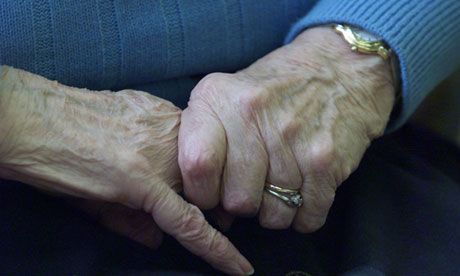Telecare arrives on the high street this week with the launch by O2 of a package aimed at families a bit worried about Mum or Dad. For £99 down plus £20 a month, a person gets a mobile device that connects to a 24/7 support centre, makes calls to four pre-set numbers, and sends an alert and GPS location when it thinks they may have fallen or wandered outside a programmed zone.
The launch of Help at Hand, to be followed soon by comparable products from other companies, marks a watershed in the assistive technology market. Until now, telecare has been available largely only through local councils and/or via landlines. This offers a mobile solution direct to the consumer.
Anyone concerned about the care gap and how it is going to be filled, short of the vanishingly unlikely prospect of recruiting an extra million social care workers over the next decade, should be heartened by the development. But it comes at a time of growing doubt about the efficacy of telecare and, in particular, telehealth – the application of similar technology to the care and support of the 15 million people living with one or more long-term conditions. Confidence in the outlook for telehealth has taken a severe knock with publication of research suggesting that its use – monitoring people’s vital signs such as blood pressure and blood glucose levels – had no discernible effect, over 12 months, on the quality of life of patients with lung disease, diabetes or heart failure in pilot studies in Cornwall, Kent and London. The research, part of the official whole systems demonstrator (WSD) trials of the technology, the biggest such evaluation in the world, concluded that telehealth “should not be used as a tool to improve health-related quality of life or psychological outcomes”.
There may well be more such dispiriting news to come in further detailed WSD results. Yet the government has already enthusiastically endorsed telehealth on the basis of early headline findings, which were strikingly positive, by contrast, and has launched the 3millionlives programme to extend telehealth and telecare to at least 3 million more people over five years. Unveiling the programme in December 2011, David Cameron declared: “We’ve trialled it, it’s been a huge success and now we’re on a drive to roll this out nationwide.”
Those headline findings included a 45% reduction in mortality rates among people using the technology, a 20% cut in emergency hospital admissions and a 15% reduction in A&E attendances. Deeply impressive numbers at face value, but many academics involved in the evaluation were affronted by the baldness of the claims and by what they saw as a dash to make policy on the scantiest of evidence. There may now, indeed, be some settling of scores going on.
What are we to make of this confusion? On one hand, it seems clear that, used appropriately as part of a broader care package, telecare and telehealth can be beneficial. In Leeds, where the council tested 02’s new product, there has been a saving of at least £2,330 a year in care costs for every individual compared with the costs of traditional support.
Zowie Mansfield, 31, from Scunthorpe, who has multiple sclerosis, has been testing Help at Hand. She says: “I’d not been out of the house on my own in a long while. It’s given me the confidence to start doing it again.” On the other hand, it seems equally clear that the Department of Health over-claimed the merits of telecare and telehealth in those headline findings. And that has done no favours to the industry behind the technology or, as it turns out, to the many people who could benefit from its application. Fourteen months on from its launch, 3millionlives seems to be going nowhere.
Intuitively, telecare/telehealth feels like a key pillar of the future care system. To be that, however, it does need a credible evidence base.







